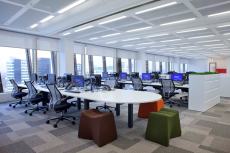June 4, 2013
First non-UK BREEAM outstanding award redraws the green building battle lines
The jostling for position in the field of environmental accreditations for buildings has taken a new turn with the announcement that a project in the Czech republic is the first commercial building outside the UK to achieve a BREEAM outstanding rating. The Tower at the Spielberk development in Brno designed by architects Studio Acht is, according to the Building Research Establishment (BRE), a true demonstration of good design, reducing CO2 emissions by over 50 percent compared to a typical building, built to Czech regulations. BRE Director Martin Townsend awarded the BREEAM outstanding certificate to Stefan de Goeij, Head of Property Management at CTP, for the office building which is located in the centre of the Czech Republic’s emerging high-tech city of Brno.






















May 30, 2013
UK public sector leading the way in procurement and sustainable building
by Paul Statham • Comment, Facilities management, Public Sector, Technology
Nottingham City Council’s Loxley Building
Over the last few years, the UK Government has grown increasingly interested in finding ways of making its £30 billion property portfolio more efficient. Both the last Labour government and the current Coalition administration have been driven by the opportunities offered them with the advent of new technology, new ways of working and new procurement models. They’ve pursued these issues to cut costs by reducing and changing the way property is designed and managed but have also found how that can also help to establish best practice in sustainable building. What is increasingly apparent, especially given recent news from the Major Projects Authority about cost savings in procurement is that the public sector is now leading the way as models of good practice.
(more…)